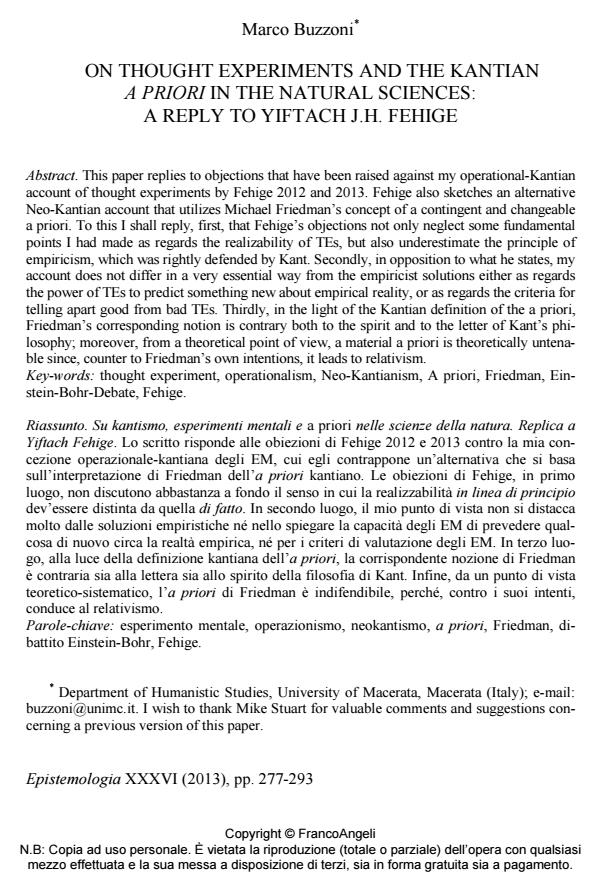Su kantismo, esperimenti mentali e a priori nelle scienze della natura. Replica a Yiftach Fehige.
Journal title EPISTEMOLOGIA
Author/s Marco Buzzoni
Publishing Year 2014 Issue 2013/2
Language English Pages 17 P. 277-293 File size 637 KB
DOI 10.3280/EPIS2013-002006
DOI is like a bar code for intellectual property: to have more infomation
click here
Below, you can see the article first page
If you want to buy this article in PDF format, you can do it, following the instructions to buy download credits

FrancoAngeli is member of Publishers International Linking Association, Inc (PILA), a not-for-profit association which run the CrossRef service enabling links to and from online scholarly content.
This paper replies to objections that have been raised against my operational-Kantian account of thought experiments by Fehige 2012 and 2013. Fehige also sketches an alternative Neo-Kantian account that utilizes Michael Friedman’s concept of a contingent and changeable a priori. To this I shall reply, first, that Fehige’s objections not only neglect some fundamental points I had made as regards the realizability of TEs, but also underestimate the principle of empiricism, which was rightly defended by Kant. Secondly, in opposition to what he states, my account does not differ in a very essential way from the empiricist solutions either as regards the power of TEs to predict something new about empirical reality, or as regards the criteria for telling apart good from bad TEs. Thirdly, in the light of the Kantian definition of the a priori, Friedman’s corresponding notion is contrary both to the spirit and to the letter of Kant’s philosophy; moreover, from a theoretical point of view, a material a priori is theoretically untenable since, counter to Friedman’s own intentions, it leads to relativism.
Keywords: Thought experiment, operationalism, Neo-Kantianism, A priori, Friedman, Einstein- Bohr-Debate, Fehige
- Buzzoni M. (2005). Kuhn und Wittgenstein: Paradigmen, Sprachspiele und Wissenschaftsgeschichte. In Stadler F., Stöltzner M. (eds.), Zeit und Geschichte/Time and History, Ludwig Wittgenstein Gesellschaft, Kirchberg a.W., pp. 38-40.
- Buzzoni M. (2008). Thought Experiment in the Natural Sciences. An Operational and Reflexive-Transcendental Conception, Würzburg, Konigshausen/Neumann.
- Buzzoni M. (2012). Thought Experiments from a Kantian Point of View. In Brown J.R.,
- Frappier M., Meynell L. (eds.) (2012), pp. 90-106. Fehige Y. (2012). ‘Experiments of Pure Reason’: Kantianism and Thought Experiments in Science, Epistemologia, 35, pp. 141-160.
- Fehige Y. (2013). The Relativized A Priori and The Laboratory of The Mind: Towards A Neo-Kantian Account of Thought Experiments in Science, Epistemologia, 36, pp. 55-73.
- Friedman M. (2002). Kant, Kuhn, and the Rationality of Science, Philosophy of Science, 69, pp. 171-190.
- Haller R. (1987). Kommentar zu dem Vortrag von Konrad Lorenz über Evolution und Apriori. In Riedl R., Wuketits F. (eds.), Die evolutionäre Erkenntnistheorie. Bedingungen-Lösungen-Kontroversen, Berlin-Hamburg, Parey, pp. 19-24.
- Husserl E. (1950), Ideen zu einer reinen Phänomenologie und phänomenologischen Philosophie, Den Haag, Martinus Nijhoff.
- Körner S. (1969). Fundamental questions of philosophy: one philosopher’s answers, The Harvester press, Brighton (Sessex). Quotations are from the fourth edition (1979), Atlantic Highlands (N.J), Humanities Press.
- Kuhle M., Kuhle S. (2003). Kants Lehre vom Apriori in ihrem Verhältnis zu Darwins Evolutionstheorie, Kant-Studien, 94, pp. 220-239.
- Lorenz K. (1941/1942). Kants Lehre vom Apriorischen im Lichte gegenwärtiger Biologie. Blätter für deutsche Philosophie, 15, pp. 94-125.
- Lorenz K. (1959). Gestaltwahrnehmung als Quelle wissenshaftlicher Erkenntnis, Zeitschrift far experimentelle and angewandte Psychologie, 6, pp. 118-165.
- Lorenz K. (1973). Die Rückseite des Spiegels, Piper, München, Engl. Transl., Behind the Mirror, London, Methuen, 1977.
- Luckhardt C.G. (1978). Beyond Knowledge: Paradigms in Wittgenstein’s Later Philosophy, Philosophy and Phenomenological Research, 39, pp. 240-252.
- Mach E. ([1883] 1933). Die Mechanik in ihrer Entwickelung. Historisch-kritisch dargestellt, Leipzig, Brockhaus.
- Philström S., Sitonen A. (2006). The Transcendental Method and (Post-)Empiricist Philosophy of Science, Journal for General Philosophy of Science, 36, pp. 81-106.
- Poincaré H. (1902) (reprint 1968). La science et l’hypothèse, Paris, Flammarion.
- Popper K.R (1963). Conjectures and Refutations, London, Routledge & Kegan Paul.
- Popper K.R. (1970). Normal Science and Its Dangers. In Lakatos I., Musgrave A. (eds.), Criticism and the Growth of Knowledge, Cambridge (Mass.), Cambridge University Press, pp. 51-58.
- Reichenbach H. (1920). Relativitätstheorie und Erkenntnis a priori, Berlin, Springer.
- Scheffler I. (1967). Science and Subjectivity, Indianapolis (Indiana), Bobbs-Merrill.
- Trendelenburg A. (1846). Geschichte der Kategorienlehre. Berlin, Bethge.
- Arthur R.T.W. (2012). Can Thought Experiments Be Resolved by Experiment? The Case of Aristotle’s Wheel. In Brown J.R., Frappier M., Meynell L. (eds.) (2012), pp. 107-122.
- Bridgman P.W. (1927). The Logic of Modern Physics, New York, Macmillan.
- Brown J.R. (1991). Laboratory of the Mind: Thought Experiments in the Natural Sciences, London-New York, Routledge.
- Brown J.R. (2012). What Do We See in a Thought Experiment? In Brown J.R., Frappier M., Meynell L. (eds.) (2012), pp. 53-89.
- Brown J.R., Frappier M., Meynell L. (eds.) (2012), Thought Experiments in Philosophy, Science, and the Arts, London-New York, Routledge.
- Buzzoni M. (1982). Conoscenza e realtà in Karl R. Popper, Milano, FrancoAngeli.
- Buzzoni M. (1986). Semantica, ontologia ed ermeneutica della conoscenza scientifica. Saggio su T.S. Kuhn, Milano, FrancoAngeli.
- Buzzoni M. (1993). Sprachphilosophische und methodologische Probleme der Übersetzung. In Frank A.P., Maaß K.-J., Paul F., Turk H. (eds.), Übersetzen, Verstehen, Brücken bauen. Geisteswissenschaftliches und literarisches Übersetzen im internationalen Kulturaustausch, Berlin, Schmidt, pp. 22-57.
- Buzzoni M. (2004). Esperimento ed esperimento mentale, Milano, FrancoAngeli.
- Exploring How Students Construct Collaborative Thought Experiments During Physics Problem-Solving Activities Hartono Bancong, Jinwoong Song, in Science & Education /2020 pp.617
DOI: 10.1007/s11191-020-00129-3 - Thought Experiments Nenad Miscevic, pp.31 (ISBN:978-3-030-81081-8)
- From naturalized to actualized thought experiments: cognitive neuroscience, the theory gap, and the method of cases Ryan M. Nefdt, Giosuè Baggio, in Philosophical Psychology /2025 pp.1
DOI: 10.1080/09515089.2025.2608211
Marco Buzzoni, On thought experiments and the Kantian a priori in the natural sciences: a reply to Yiftach J.H. Fehige in "EPISTEMOLOGIA" 2/2013, pp 277-293, DOI: 10.3280/EPIS2013-002006